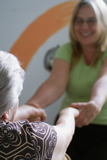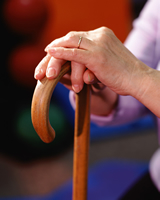Preventing Falls

Falls are common after a stroke. The good news is that you can help! There are ways to protect your loved one from falls.
What Are Risk Factors for Falls?
- Past falls
- Trouble walking or getting up
- Balance problems
- Feeling weak and dizzy
- Problems with vision and hearing
- Side effects of medicines
Why Is It Important to Get Help?
Falls can cause broken bones, head injuries and even death. Ask your healthcare team for help. Your healthcare team can identify your loved one’s risks for falling. Ask about a falls assessment. Occupational therapists can come to your home and help make your house safer. Physical therapists can teach exercises to prevent falls.
|
Red Flag: Signs of Trouble 
If your loved one falls, get help if they:
|
How Can You Make the Home Safer to Prevent Falls?
Keep floors clear:
- Remove throw rugs or tape them down.
- Pick up shoes and other items from the floor.
- Push furniture far apart to create space to walk safely.
- Move cords out of the way to avoid tripping.
Make stairs and hallways safer:
- Install handrails on indoor and outdoor stairs.
- Fix broken steps.
- Make sure carpet is securely attached.
- Keep lighting bright, especially in stairways and doorways.
Keep the bathroom safe:
- Put non-slip mats and grab bars in bathtubs and showers.
- Install a raised toilet seat.
- Use a plastic seat in the shower or tub.
Prevent falls in the bedroom:
- Use nightlights in the bedroom to make walking at night safer.
- Place a commode beside the bed. Your loved one won’t need to walk to the bathroom at night.
What Are Other Ways to Prevent Falls?
Exercise with your loved one:
- Regular exercise lowers the chances of falling.
- Exercises that improve balance, such as tai chi, are helpful.
- Your local health or senior center may have exercise and walking programs.
- The Senior Planning Services has a fact sheet that shows you how to do exercises from home. The Resources section has the link to the fact sheet.
- Learn more about exercise after stroke.
Keep an eye on medicines:
- Ask a pharmacist, doctor or nurse to review your loved one’s medicines.
- Some medicines make people dizzy or sleepy and cause falls.
- Learn the side effects of over-the-counter and prescription medicines. Warfarin (Coumadin®)** increases the risk of bleeding. This makes bruises and cuts more serious. Call your healthcare team if your loved one falls while taking Warfarin**.
- Watch for side effects. Call your healthcare team with your concerns.
- Learn more about managing medicines.
Have your loved one’s vision and hearing checked:
- Good vision and hearing lower the chances of falling.
- Have your loved one’s vision checked at least once a year.
- Change hearing aid batteries often.
Wear the right shoes:
- Your loved one’s shoes should have rubber soles and heels.
- Buy shoes with short laces or Velcro® fasteners.
- Avoid slippers or wear non-skid slippers.
Use the right devices to keep steady:
- A cane or walker can provide support.
- Ask your healthcare team about walking aids and how to use them.
- Lehigh Valley Hospital and Health Network has information on fitting yourself for a cane or walker. It also provides tips on how to use one safely. Get more tips on using canes safely on the Lehigh Valley Hospital Web site. The Resources section has contact information.
- Learn more about assistive devices.
How Can Your Loved One Call for Help in an Emergency?
It is important for your loved one to be able to call for help when they need it. Buy a medical alert system that your loved one can wear or carry. Ask your healthcare team about where to buy alert systems. Have your loved one carry a cell or portable phone at all times to call for help. Keep emergency phone numbers in large print beside every phone.Helpful Tips
- Teach your loved one to stand up slowly after sitting.
- After lying down, your loved one should sit on the side of the bed for a few minutes before standing.
- Watch for things that can cause falls when walking. Uneven sidewalks, door steps, liquid spills, ice and pets can cause falls.
Remember
- Make your home safer to prevent falls.
- Do balance exercises, such as tai chi. These types of exercises can lower the chances of falling.
- Have your loved one’s vision and hearing checked regularly.
- Talk with your healthcare team about ways to prevent falls. Ask the team to review your loved one’s medicines.
More Resources 
Additional credible resources on this topic can be found here. Website pages may change or update, therefore if a link does not work, you may also try to type the information into your internet search bar. This Resource List will be updated frequently.
|
*Link Disclaimer: Links to information and Web sites outside of the Department of Veterans Affairs do not indicate an endorsement of products or services offered by the sites. In addition, these sites may have privacy and security policies that are inconsistent with those of VA. |
References: VA National Center for Patient Safety. (2008). Are you or a loved one at risk for falls? Retrieved May 27, 2008, from the falls tool kit: http://www.va.gov/ncps; Centers for Disease Control and Prevention. (2008). Falls among older adults: An overview. Retrieved July 31, 2008, from: http://www.cdc.gov*; Houts, P.S. (Ed.). (2004). Eldercare at home. New York, New York: The American Geriatric Society for Health in Aging; American Academy of Orthopaedic Surgeons. (2008). Lifting techniques for home caregivers. Retrieved July 31, 2008, from: http://orthoinfo.aaos.org/topic.cfm?topic=A00096*
These materials were created for the project:
Web-Based Informational Materials for Caregivers of Veterans Post-Stroke
Project Number SDP 06-327 funded by VA HSR&D Quality Enhancement Research Initiative (QUERI)



















